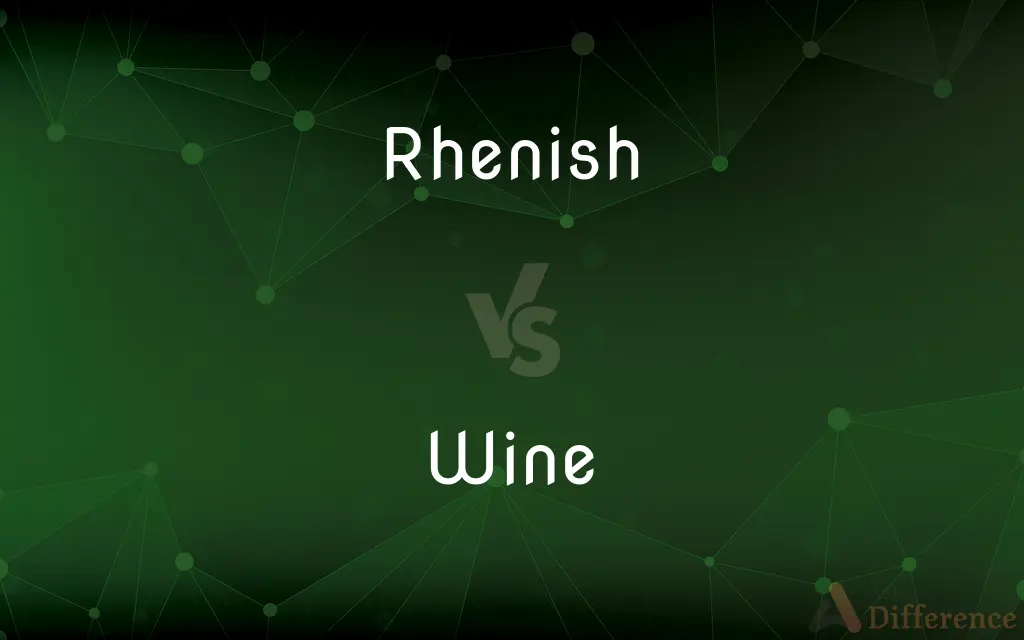Rhenish vs. Wine — What's the Difference?
By Tayyaba Rehman & Maham Liaqat — Updated on March 25, 2024
Rhenish refers specifically to wines from the Rhine region of Germany, focusing on a geographic origin, while wine is a broader term for fermented grape juice from various regions and types.

Difference Between Rhenish and Wine
Table of Contents
ADVERTISEMENT
Key Differences
Rhenish wine denotes a specific category of wine that originates from the Rhine region in Germany, known for its unique climate and soil conditions which contribute to the distinct flavors of these wines. On the other hand, wine is a more encompassing term that refers to the alcoholic beverage made by fermenting grapes, without specific regard to region, grape variety, or winemaking technique.
While Rhenish wines are celebrated for their high quality, especially the white wines such as Riesling, which are characterized by their crisp acidity, floral aromas, and sometimes sweet profile, wine, in general, can vary widely in taste, color, and aroma depending on the grape variety used, the region it comes from, and the methods employed during fermentation and aging.
Rhenish wines, given their geographic specificity, are often subject to strict regulations and standards that govern their production to ensure quality and authenticity. This contrasts with the broader category of wine, where standards and regulations can vary significantly from one region to another, encompassing a vast range of wine styles and qualities from all over the world.
The term Rhenish not only reflects the geographic origin of the wine but also often implies a certain level of quality and tradition associated with German winemaking practices. Meanwhile, wine as a broader category includes everything from inexpensive, everyday table wines to high-end, vintage wines from prestigious vineyards around the globe.
Given the specificity of Rhenish wines to a particular region, these wines can offer a unique tasting experience that reflects the terroir of the Rhine valley. In contrast, the term wine encompasses a global industry with diverse practices, climates, and soil types contributing to a wide array of wine experiences.
ADVERTISEMENT
Comparison Chart
Definition
Wines specifically from the Rhine region in Germany
Alcoholic beverage made from fermented grapes
Origin
Rhine region, Germany
Global
Varieties
Mostly white wines, especially Riesling
Red, white, rosé, sparkling, dessert, fortified
Regulations
Subject to German wine laws and standards
Varies by region and country
Taste & Aroma
Often characterized by crisp acidity, floral aromas
Varies widely depending on grape, region, and winemaking process
Tradition & Quality
Implies a certain level of quality and tradition in winemaking
Ranges from everyday table wines to high-end vintages
Terroir Influence
High, reflecting the unique climate and soil of the Rhine valley
Depends on the specific region and conditions
Compare with Definitions
Rhenish
Wine from Germany's Rhine region.
The dinner featured a selection of Rhenish wines, highlighting their distinct flavors.
Wine
Fermented grape juice alcohol.
Wine varieties include red, white, and rosé.
Rhenish
Specifically, German white wines.
He prefers Rhenish for its crisp and floral notes.
Wine
Produced worldwide.
Italian and French wines are renowned globally.
Rhenish
Known for quality and tradition.
Rhenish wines carry a reputation for quality rooted in centuries of winemaking.
Wine
Varies in taste and quality.
Wine can range from sweet to dry and simple to complex.
Rhenish
Offers unique terroir expression.
This Rhenish Riesling expresses the unique terroir of its vineyard.
Wine
Encompasses many styles.
From sparkling to fortified, wine offers diverse experiences.
Rhenish
Reflects strict production standards.
Rhenish wines must adhere to German wine laws.
Wine
Reflects regional characteristics.
Each wine region imparts unique characteristics to its wines.
Rhenish
Of or relating to the Rhine River or the lands bordering on it.
Wine
Wine is an alcoholic drink typically made from fermented grapes. Yeast consumes the sugar in the grapes and converts it to ethanol, carbon dioxide and heat.
Rhenish
See Rhine wine.
Wine
An alcoholic drink made from fermented grape juice
He opened a bottle of red wine
The regional foods and wines of France
Rhenish
Of or pertaining to the river Rhine; as, Rhenish wine.
Wine
Entertain someone by offering them drinks and a meal
Members of Congress have been lavishly wined and dined by lobbyists for years
Rhenish
Any of several white wines from the Rhine River valley in Germany (`hock' is British usage)
Wine
Dance with rhythmic gyratory movements of the pelvic region
The crowd jumped and wined and churned the field into mud
Rhenish
Of or relating to the Rhine River and the lands adjacent to it;
Rhenish wines tend to be sweet
Wine
A beverage made of the fermented juice of any of various kinds of grapes, usually containing from 10 to 15 percent alcohol by volume.
Wine
A beverage made of the fermented juice of any of various other fruits or plants.
Wine
Something that intoxicates or exhilarates.
Wine
The color of red wine.
Wine
To provide or entertain with wine.
Wine
To drink wine.
Wine
An alcoholic beverage made by fermenting grape juice, with an ABV ranging from 5.5–16%.
Wine is usually stronger than beer.
"Wine improves with age but I improve with wine," she slurred as she slid gracefully beneath the table.
Wine
An alcoholic beverage made by fermenting other substances, producing a similar ABV.
...dandelion wine, rice wine, plum wine...
Wine
(countable) A serving of wine.
I'd like three beers and two wines, please. My friend will have the same.
Wine
(uncountable) The color of red wine, a deep reddish purple.
Wine
Wind.
Wine
(transitive) To entertain with wine.
Wine
(intransitive) To drink wine.
Wine
The expressed juice of grapes, esp. when fermented; a beverage or liquor prepared from grapes by squeezing out their juice, and (usually) allowing it to ferment.
Wine is a mocker, strong drink is raging, and whosoever is deceived thereby is not wise.
Bacchus, that first from out the purple grapeCrushed the sweet poison of misused wine.
Wine
A liquor or beverage prepared from the juice of any fruit or plant by a process similar to that for grape wine; as, currant wine; gooseberry wine; palm wine.
Wine
The effect of drinking wine in excess; intoxication.
Noah awoke from his wine.
Wine
Fermented juice (of grapes especially)
Wine
A red as dark as red wine
Wine
Drink wine
Wine
Treat to wine;
Our relatives in Italy wined and dined us for a week
Common Curiosities
How does wine differ from Rhenish in terms of production?
Wine production varies globally and includes a broad range of styles and methods, whereas Rhenish production is more specific to the Rhine region and adheres to German winemaking standards.
Can Rhenish be a red wine?
While Rhenish wines are predominantly white, the Rhine region can produce red wines, but they are less common.
Why is the term "wine" more general than "Rhenish"?
Wine refers to all alcoholic beverages made from fermented grapes, encompassing a global industry, while Rhenish specifically denotes wines from the Rhine region of Germany.
Can the quality of wine vary as much as that of Rhenish?
Yes, the quality of wine can vary widely, from everyday table wines to premium vintages, just as Rhenish wines have their range of quality, generally upheld by strict regional standards.
What makes Rhenish wines unique?
Rhenish wines are unique due to their specific origin in Germany's Rhine region, known for producing high-quality wines, especially white wines like Riesling, with distinctive flavors.
How do wine regulations affect Rhenish wines?
Rhenish wines are subject to German wine laws, which dictate everything from grape varieties to labeling, ensuring the quality and authenticity of the wines produced in the region.
Are Rhenish wines always sweet?
Not necessarily. While some Rhenish wines, particularly Riesling, can be sweet, there are also dry and semi-dry variants, offering a range of taste profiles.
Why is Rhenish wine considered high quality?
The combination of the Rhine region's terroir, strict production standards, and a long tradition of winemaking contribute to the high quality of Rhenish wines.
Is Rhenish wine only white?
Predominantly, yes, but there are exceptions where red wines are produced in the Rhine region, though they are less common compared to white wines.
Can the term "wine" include Rhenish?
Yes, Rhenish is a subset of wine, specifically referring to wines from the Rhine region of Germany.
How do I choose a good Rhenish wine?
Look for wines from reputable producers within the Rhine region, consider the vintage, and seek out wines that have received positive reviews or awards.
How does climate impact Rhenish compared to other wines?
The Rhine region's climate significantly impacts Rhenish wines, giving them unique characteristics. In contrast, other wines reflect the diverse climates of their respective regions.
What are the main differences in taste between Rhenish and other wines?
Rhenish wines, particularly white wines, are known for their crisp acidity and floral notes, while other wines can range widely in flavor based on grape variety and winemaking techniques.
Share Your Discovery

Previous Comparison
Phoenix vs. Dragon
Next Comparison
Bade vs. FadeAuthor Spotlight
Written by
Tayyaba RehmanTayyaba Rehman is a distinguished writer, currently serving as a primary contributor to askdifference.com. As a researcher in semantics and etymology, Tayyaba's passion for the complexity of languages and their distinctions has found a perfect home on the platform. Tayyaba delves into the intricacies of language, distinguishing between commonly confused words and phrases, thereby providing clarity for readers worldwide.
Co-written by
Maham Liaqat













































